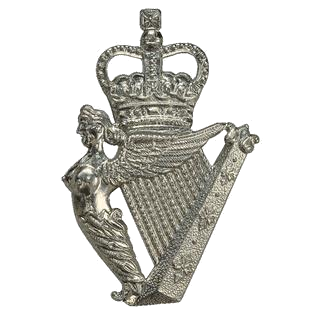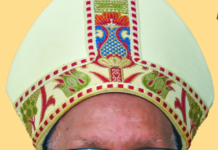Archbishop John McDowell, the Church of Ireland’s Archbishop of Armagh and Primate of All Ireland, this afternoon preached at The Royal Irish Regiment’s annual Service of Remembrance in Belfast Cathedral, which marked this year’s 80th anniversaries of the Normandy Landings and the Liberation of Rome, in which several of its predecessor regiments took part.
In the course of his remarks, the Primate recalled the wartime sacrifices of relatives and neighbours in Belfast and considered the question of the causes of the Second World War – and the ultimate triumph of good over evil.
“The Cross is a tragedy greater than any war,” he remarked. “In the Cross, God went deeper into innocent suffering than has ever happened in war or in peace. On the Cross, human folly and evil lost its chief servant – death – which now became the minister for eternal life.
“And, whether consciously articulated or not, or even whether implicitly believed or not, by those young men who waded from landing crafts onto Sword Beach or who landed in gliders in fields which Rommel had flooded, we know that in the end evil cannot triumph, because it failed to do so on the one occasion when it could – on the Cross of the Son of God.”
Archbishop McDowell’s sermon is available in full below:
May all the words that I say to you be in the Name of the Father and of the Son and of the Holy Spirit. Go raibh na foclaí uilig deirim libh, in anim Dia bheo, an t–Aithair, a Mac agus an Spiorad Naomh. Amen.
“Who shall separate us from the love of God in Christ Jesus our Lord?” (Romans 8:35) “Quis separabit nos caritate Dei in Jesum Christum Dominum Nostrum?”
We are here today to remember and give thanks for those from the Royal Ulster Rifles, Royal Inniskilling Fusiliers, Royal Irish Fusiliers and London Irish Rifles who fought, and especially those who died or were seriously wounded, on D–Day in Normandy and in the liberation of Rome in this 80th anniversary year.
One war can be very different form another, not only in how they are fought but in how they begin and end. The Great War began in a jamboree of patriotic fervour and ended in disillusionment and utter exhaustion. We say simply “the guns fell silent”. The Second World War began with that almost apologetic statement broadcast by the Prime Minister of the time, Neville Chamberlain, in the whispered words “…and as a result this country is at war with Germany”. And it ended with the total defeat of Germany, her cities in ruins, her armed forces prostrated, and victory celebrated by street parties all over the United Kingdom.
In Japan, atomic weapons were used for the first and last time ever against a nation which had no word for “surrender” or “defeat” in its Imperial language. Instead, the Emperor had to say that “the war had not turned out to Japan’s advantage”. At the end of the Great War, “revenge and “punishment” were the dominant themes of the Peace Conference. After the Second World War there was no single peace conference but the dominant aim was for the rebuilding of the world economy and the laying out of a rules–based international order. The politicians of that war and those soldiers who fought in it and who went on to become politicians and diplomats also went on to create the Welfare State, the Bretton Woods Agreement which was designed to stabilise financial markets and central banks, and of course the United Nations.
At the end of the Great War, it wasn’t long before suspicion began to fall on its senior military leaders. After the Second World War politicians and military figures were cheered to the rafters as heroes – although some were more likeable than others. As Churchill said of Montgomery: “In defeat indomitable; in advance invincible; in victory insufferable.” The grammar school that I attended which was built just after the war had as the names of its houses, Alexander, Alanbrooke, Montgomery and Dill – the four Irish field marshals who played so prominent a part in the Allied victory in different theatres of the war.
Our grandfathers had fought in the Great War and spoke little of it. Although our fathers and uncles and aunts who fought in the Second World War said just as little, they were nevertheless as large as life around us, and we could easily guess what it must have been like to fight south of the Irrawaddy River in the jungles of Burma or to have been a merchant seaman on the Archangel or Murmansk convoys as two of my own uncles had been.
And even if we lacked an imagination of our own to consider these things, the gap was amply filled by the comics and little magazines full of war stories which proliferated until about fifteen years after the war. To use the words of Samuel Johnston, “every man thought ill of himself for not having been a soldier”.
I was brought up in a housing estate which was built specifically for ex–servicemen returning from the war, and their return brought a certain exoticness to that little corner of East Belfast, particularly in the form of wives who the men had met when serving overseas. In our street there were wives from Malta, Gibraltar and France, each of whom adopted our community prejudices with cheerful enthusiasm.
On the boundary of the estate was a terrace built for returning disabled soldiers of the Royal Engineers, where most of the men had lost one and some two limbs. They were great men, fully involved in the life of Church and community, and certainly weren’t going to let the trauma of severe injuries prevent them from making their mark in a peacetime world.
We owe those men and the many who didn’t come back – and of whose shades both Archbishop Eamon and I were all too well aware as we walked on Sword Beach or sat listening in peace to the evening birdsong in Ranville Cemetery. We owe them our heartfelt gratitude and should cherish these moments of remembrance.
And perhaps we owe them also something else – to ask and answer the question: “What kind of civilisation carried this war in its womb and gave birth to it in 1939?” And we ask the question to make sure that we do all that we can to make sure that it never happens again.
It is a question that has proved very difficult to answer about the Great War. It is very telling that probably the best book to have emerged about the origins of the Great War at the time of its centenary a few years ago was entitled Sleep Walkers. In the case of the Second World War, the answer is in one sense very straightforward. The rise of fascism and Nazism in Europe with its poisonous mix of anti–Semitism, theories of racial superiority and explicit belief that “might is right” made the coming of war all but inevitable.
Right up to the outbreak of the Second World War there was frenetic diplomatic activity to try to avoid it. But diplomacy fails when ambassadors are sent out with a debased message, demanding that their country should be first or greatest and that the others must be content to be second best or worse. Fascist Europe and Imperial Japan may have been exaggerated, inhuman and grotesque examples of that conviction, but when any country or group within a country has only itself as the centre of its concerns, and not the good of all citizens or all nations, their nemesis is slow but it will be sure. The world gets a long time to pay, but all the accounts are kept.
That sort of diplomacy, and the politics from which it arises with all the energy of a perverse world, pulls so hard against God’s holiness and the sovereignty of his love that in the end the knot is so tight that God Himself has to undo it. The Cross is a tragedy greater than any war. In the Cross, God went deeper into innocent suffering than has ever happened in war or in peace. On the Cross, human folly and evil lost its chief servant – death – which now became the minister for eternal life.
And, whether consciously articulated or not, or even whether implicitly believed or not, by those young men who waded from landing crafts onto Sword Beach or who landed in gliders in fields which Rommel had flooded, we know that in the end evil cannot triumph, because it failed to do so on the one occasion when it could – on the Cross of the Son of God.
And wars are not only caused by a failure of diplomacy. In a real sense in Europe, they have been caused or at least helped along by the failure of the Church – a failure to be a curb and a cure for society’s boundless egotism and above all a failure to witness to the eternal truth that God is not our pet or our patron, but that he is our Judge and our Redeemer. And even where the Church has spoken, it has too often been only with the candour of a friend but not with the kindness of a brother.
Nevertheless, by and large it is the State which makes wars and it is young men who fight wars. There are now only a very few of those young men still living who fought and who retuned from Sword Beach. So it has been important that today we are able to remember those who fought with them and who did not return; and those who have died in the intervening eighty years. And it is important too that we should not be like that famous description of the Bourbon monarchy of whom it is said that they “forgot nothing and learned nothing”. We are called to remember and to give thanks and to learn.
Alive or at rest in the nearer presence of the God and Father of our Lord Jesus Christ, our heart’s prayer is that those young men should hear these words:
“Quis separabit nos a caritate Dei…? (Who shall separate us from the love of God?)”
And the answer?
“Neither death nor life, neither angels nor demons, neither the present nor the future, nor any powers, neither height nor depth, nor anything else in all creation, will be able to separate us from the love God that is in Christ Jesus our Lord.”
We thank God for the sacrifices they made and for the greatness of their hearts and souls.
And now unto Him who by the power at work within us is able to do far more than all we can do or think, be glory in the Church and in Christ Jesus unto all generations, for ever and ever.










